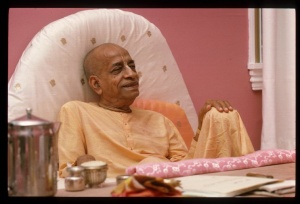SB 8.7.29: Difference between revisions
m (1 revision(s)) |
(Vanibot #0054 edit - transform synonyms into clickable links, which search similar occurrences) |
||
| (One intermediate revision by one other user not shown) | |||
| Line 1: | Line 1: | ||
{{info | {{info | ||
|speaker= | |speaker=Prajāpatis | ||
|listener=Lord | |listener=Lord Śiva | ||
}} | }} | ||
[[Category:Srimad-Bhagavatam - Canto 08 Chapter 07]] | |||
[[Category:Bhagavatam Verses Spoken by the Prajapatis - Vanisource|080729]] | |||
<div style="float:left">'''[[Srimad-Bhagavatam]] - [[SB 8|Eighth Canto]] - [[SB 8.7: Lord Siva Saves the Universe by Drinking Poison|Chapter 7: Lord Śiva Saves the Universe by Drinking Poison]]'''</div> | |||
<div style="float:right">[[File:Go-previous.png|link=SB 8.7.28]] '''[[SB 8.7.28]] - [[SB 8.7.30]]''' [[File:Go-next.png|link=SB 8.7.30]]</div> | |||
{{RandomImage}} | |||
==== TEXT 29 ==== | ==== TEXT 29 ==== | ||
<div | <div class="verse"> | ||
mukhāni pañcopaniṣadas taveśa | :mukhāni pañcopaniṣadas taveśa | ||
yais triṁśad-aṣṭottara-mantra-vargaḥ | :yais triṁśad-aṣṭottara-mantra-vargaḥ | ||
yat tac chivākhyaṁ paramātma-tattvaṁ | :yat tac chivākhyaṁ paramātma-tattvaṁ | ||
deva svayaṁ-jyotir avasthitis te | :deva svayaṁ-jyotir avasthitis te | ||
</div> | </div> | ||
| Line 17: | Line 22: | ||
==== SYNONYMS ==== | ==== SYNONYMS ==== | ||
<div | <div class="synonyms"> | ||
''[//vanipedia.org/wiki/Special:VaniSearch?s=mukhāni&tab=syno_o&ds=1 mukhāni]'' — faces; ''[//vanipedia.org/wiki/Special:VaniSearch?s=pañca&tab=syno_o&ds=1 pañca]'' — five; ''[//vanipedia.org/wiki/Special:VaniSearch?s=upaniṣadaḥ&tab=syno_o&ds=1 upaniṣadaḥ]'' — Vedic literatures; ''[//vanipedia.org/wiki/Special:VaniSearch?s=tava&tab=syno_o&ds=1 tava]'' — your; ''[//vanipedia.org/wiki/Special:VaniSearch?s=īśa&tab=syno_o&ds=1 īśa]'' — O lord; ''[//vanipedia.org/wiki/Special:VaniSearch?s=yaiḥ&tab=syno_o&ds=1 yaiḥ]'' — by which; ''[//vanipedia.org/wiki/Special:VaniSearch?s=triṁśat&tab=syno_o&ds=1 triṁśat]-[//vanipedia.org/wiki/Special:VaniSearch?s=aṣṭa&tab=syno_o&ds=1 aṣṭa]-[//vanipedia.org/wiki/Special:VaniSearch?s=uttara&tab=syno_o&ds=1 uttara]-[//vanipedia.org/wiki/Special:VaniSearch?s=mantra&tab=syno_o&ds=1 mantra]-[//vanipedia.org/wiki/Special:VaniSearch?s=vargaḥ&tab=syno_o&ds=1 vargaḥ]'' — in the category of thirty-eight important Vedic ''mantras''; ''[//vanipedia.org/wiki/Special:VaniSearch?s=yat&tab=syno_o&ds=1 yat]'' — that; ''[//vanipedia.org/wiki/Special:VaniSearch?s=tat&tab=syno_o&ds=1 tat]'' — as it is; ''[//vanipedia.org/wiki/Special:VaniSearch?s=śiva&tab=syno_o&ds=1 śiva]-[//vanipedia.org/wiki/Special:VaniSearch?s=ākhyam&tab=syno_o&ds=1 ākhyam]'' — celebrated by the name Śiva; ''[//vanipedia.org/wiki/Special:VaniSearch?s=paramātma&tab=syno_o&ds=1 paramātma]-[//vanipedia.org/wiki/Special:VaniSearch?s=tattvam&tab=syno_o&ds=1 tattvam]'' — which ascertain the truth about Paramātmā; ''[//vanipedia.org/wiki/Special:VaniSearch?s=deva&tab=syno_o&ds=1 deva]'' — O lord; ''[//vanipedia.org/wiki/Special:VaniSearch?s=svayam&tab=syno_o&ds=1 svayam]-[//vanipedia.org/wiki/Special:VaniSearch?s=jyotiḥ&tab=syno_o&ds=1 jyotiḥ]'' — self-illuminated; ''[//vanipedia.org/wiki/Special:VaniSearch?s=avasthitiḥ&tab=syno_o&ds=1 avasthitiḥ]'' — situation; ''[//vanipedia.org/wiki/Special:VaniSearch?s=te&tab=syno_o&ds=1 te]'' — of Your Lordship. | |||
</div> | </div> | ||
| Line 24: | Line 29: | ||
==== TRANSLATION ==== | ==== TRANSLATION ==== | ||
<div | <div class="translation"> | ||
O lord, the five important Vedic mantras are represented by your five faces, from which the thirty-eight most celebrated Vedic mantras have been generated. Your Lordship, being celebrated as Lord Śiva, is self-illuminated. You are directly situated as the supreme truth, known as Paramātmā. | O lord, the five important Vedic mantras are represented by your five faces, from which the thirty-eight most celebrated Vedic mantras have been generated. Your Lordship, being celebrated as Lord Śiva, is self-illuminated. You are directly situated as the supreme truth, known as Paramātmā. | ||
</div> | </div> | ||
| Line 31: | Line 36: | ||
==== PURPORT ==== | ==== PURPORT ==== | ||
<div | <div class="purport"> | ||
The five mantras mentioned in this connection are as follows: (1) Puruṣa, (2) Aghora, (3) Sadyojāta, (4) Vāmadeva, and (5) Īśāna. These five mantras are within the category of thirty-eight special Vedic mantras chanted by Lord Śiva, who is therefore celebrated as Śiva or Mahādeva. Another reason why Lord Śiva is called Śiva, which means "all-auspicious," is that he is self-illuminated, exactly like Lord Viṣṇu, who is the Paramātmā. Because Lord Śiva is directly an incarnation of Lord Viṣṇu, he is situated as Lord Viṣṇu's direct representative. This fact is corroborated by a Vedic mantra: patiṁ viśvasyātmeśvaraṁ śāśvatam. śivam acyutam. The Supersoul is called by many names, of which Maheśvara, Śiva and Acyuta are especially mentioned. | The five ''mantras'' mentioned in this connection are as follows: (1) ''Puruṣa'', (2) ''Aghora'', (3) ''Sadyojāta'', (4) ''Vāmadeva'', and (5) ''Īśāna''. These five ''mantras'' are within the category of thirty-eight special Vedic ''mantras'' chanted by Lord Śiva, who is therefore celebrated as Śiva or Mahādeva. Another reason why Lord Śiva is called Śiva, which means "all-auspicious," is that he is self-illuminated, exactly like Lord Viṣṇu, who is the Paramātmā. Because Lord Śiva is directly an incarnation of Lord Viṣṇu, he is situated as Lord Viṣṇu's direct representative. This fact is corroborated by a Vedic ''mantra'': ''patiṁ viśvasyātmeśvaraṁ śāśvatam. śivam acyutam''. The Supersoul is called by many names, of which Maheśvara, Śiva and Acyuta are especially mentioned. | ||
</div> | </div> | ||
__NOTOC__ | |||
<div style="float:right; clear:both;">[[File:Go-previous.png|link=SB 8.7.28]] '''[[SB 8.7.28]] - [[SB 8.7.30]]''' [[File:Go-next.png|link=SB 8.7.30]]</div> | |||
__NOTOC__ | |||
__NOEDITSECTION__ | |||
Latest revision as of 23:35, 18 February 2024

A.C. Bhaktivedanta Swami Prabhupada
TEXT 29
- mukhāni pañcopaniṣadas taveśa
- yais triṁśad-aṣṭottara-mantra-vargaḥ
- yat tac chivākhyaṁ paramātma-tattvaṁ
- deva svayaṁ-jyotir avasthitis te
SYNONYMS
mukhāni — faces; pañca — five; upaniṣadaḥ — Vedic literatures; tava — your; īśa — O lord; yaiḥ — by which; triṁśat-aṣṭa-uttara-mantra-vargaḥ — in the category of thirty-eight important Vedic mantras; yat — that; tat — as it is; śiva-ākhyam — celebrated by the name Śiva; paramātma-tattvam — which ascertain the truth about Paramātmā; deva — O lord; svayam-jyotiḥ — self-illuminated; avasthitiḥ — situation; te — of Your Lordship.
TRANSLATION
O lord, the five important Vedic mantras are represented by your five faces, from which the thirty-eight most celebrated Vedic mantras have been generated. Your Lordship, being celebrated as Lord Śiva, is self-illuminated. You are directly situated as the supreme truth, known as Paramātmā.
PURPORT
The five mantras mentioned in this connection are as follows: (1) Puruṣa, (2) Aghora, (3) Sadyojāta, (4) Vāmadeva, and (5) Īśāna. These five mantras are within the category of thirty-eight special Vedic mantras chanted by Lord Śiva, who is therefore celebrated as Śiva or Mahādeva. Another reason why Lord Śiva is called Śiva, which means "all-auspicious," is that he is self-illuminated, exactly like Lord Viṣṇu, who is the Paramātmā. Because Lord Śiva is directly an incarnation of Lord Viṣṇu, he is situated as Lord Viṣṇu's direct representative. This fact is corroborated by a Vedic mantra: patiṁ viśvasyātmeśvaraṁ śāśvatam. śivam acyutam. The Supersoul is called by many names, of which Maheśvara, Śiva and Acyuta are especially mentioned.